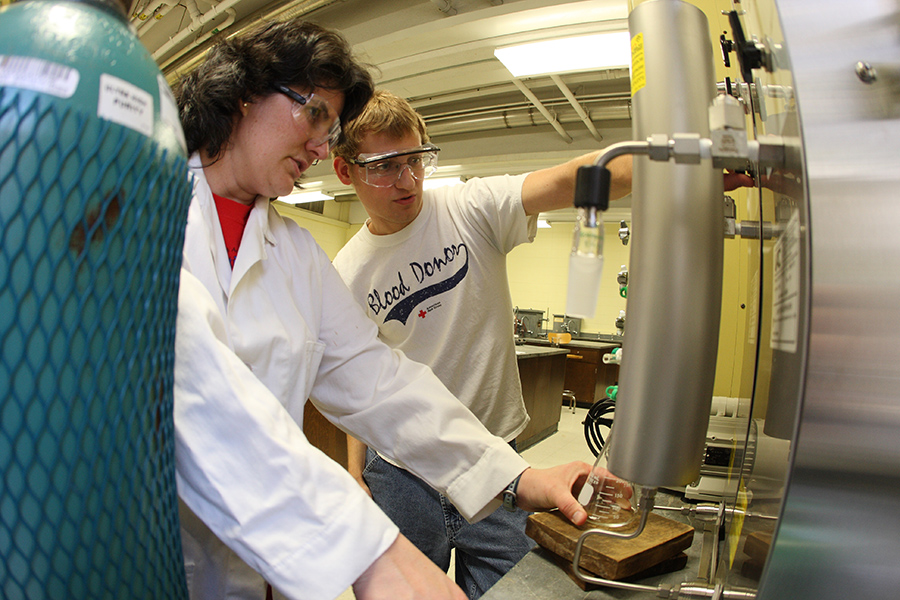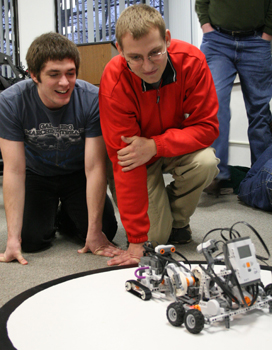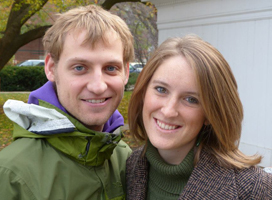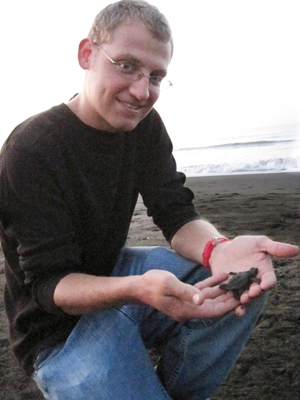


Office of Communications
2 East South Street
Galesburg, IL 61401


Edward Dale, a 2010 Knox College graduate, has been awarded a prestigious National Science Foundation Graduate Research Fellowship, which recognizes and supports outstanding graduate students in NSF-supported science, technology, engineering, and mathematics disciplines.
As a fellow, he will receive a three-year annual stipend of $30,000, a $12,000 cost-of-education allowance for tuition and fees, and opportunities for international research and professional development. He and other fellows also have the freedom to conduct their own research at any accredited U.S. institution of graduate education.
NSF received more than 13,000 applications for the 2013 competition. Fellowships were offered to 2,000 individuals.
Dale (in photo above with Knox Professor of Chemistry Diana Cermak, and in photo below at one of Knox College's traditional robot competitions) graduated summa cum laude from Knox, double-majoring in chemistry and biochemistry and earning College Honors for his research project, "Synthesis of Optically Active β-Aminophosphonic Acids." He was elected to Phi Beta Kappa as a junior and received the 2010 Harris Award in Chemistry.
Now a graduate student at Northwestern University, Dale is pursuing various molecular research projects. He briefly described a couple of them:
A native of Roscoe, Illinois, Dale said his childhood toys and a love for puzzles led him to this sort of research. "The first article I read related to this area was actually for a short literature review for [Knox Associate Professor of Chemistry Thomas Clayton's] inorganic chemistry class," he said, remembering that he was "immediately hooked."
 Being a student at Knox "shaped me in so many ways," said Dale, who co-authored a Journal of Chemical Crystallography article with Clayton and three other collaborators. "Knox was an environment that opened new ideas and ways of thinking to me."
Being a student at Knox "shaped me in so many ways," said Dale, who co-authored a Journal of Chemical Crystallography article with Clayton and three other collaborators. "Knox was an environment that opened new ideas and ways of thinking to me."
"I really owe a lot to the faculty at Knox," he added. (Photo at left: Edward Dale and his wife, Natalie.)
The influence of Professor of Chemistry Diana Cermak "helped alter my trajectory from medical school (which I now know would have been a mistake) toward graduate school and ignited a passion for research that I didn't know existed through the McNair Fellowship and an Honors Project."
Dale also described Clara A. Abbott Distinguished Professor of Chemistry Larry Welch as "an amazing professor [who] is a continuing inspiration."
"I could easily go through a long list of professors in the chemistry, biochemistry, biology, physics, and psychology departments who have played significant roles in my development, but I think the fact that there is such a list is a testament of the importance of the faculty," he added. "The close connections you can create to your professors is one of the most valuable things that comes out of Knox."
"In addition, I think the environment of Knox fosters independent thinking and creativity," said Dale, who hopes for a career in academia that combines teaching and research. "Things such as Richter Scholarships, which helped fund a number of us to pursue sea turtle conservation in Costa Rica (photo right), or the administration giving funding for chemistry demonstrations in the community are the sorts of things outside of the classroom that give students the freedom to really make something significant of their education."
Published on April 23, 2013